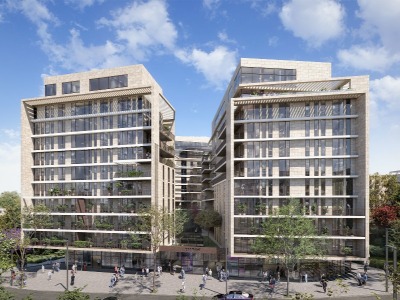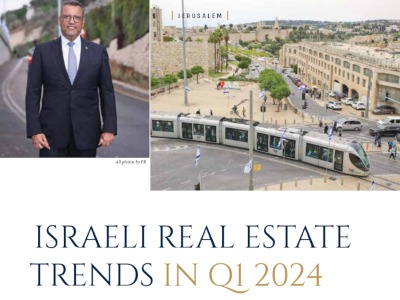
When it comes to purchasing real estate, knowledge is power. This is especially true in Israel, where skyrocketing prices amid a real estate boom raise many questions for buyers: Where and what type of property should I purchase? What areas offer the best value? What are the up-and-coming locations? How much can I afford to invest in my purchase? Should I buy a new property or renovate? And how do I go about the complex process?
As you embark on your search, real estate professionals are well equipped to guide you. They have in-depth knowledge of the various ownership structures available, where to find the most compelling real estate opportunities within your budget and, of course, properties that may best suit your vision for your new home. They can advise you in weighing your options as you plan ahead. But before you become a proud owner, it is critical to first understand the different types of ownership.
Church land ownership recently came under scrutiny in Israel due to the government’s century-long agreement with the Greek Orthodox Church, which we will elaborate upon shortly.
Many consider freehold ownership optimal. Owners do not have to pay rent or fees to a landowner, and they can benefit from better capital appreciation over the long term. But unlike in the US where freehold ownership is fairly standard, only a small fraction of Israeli citizens own the land they live on.
In fact, the Israeli government owns 93% of the country’s land. This ownership structure originated in 1948, when Israel was founded as a meager nation-state. It came about amid government fears that someone would buy out the land and ultimately overrule the authorities.
Today, the Israel Land Authority leases land for a period of 49 years, usually with an option to extend the lease for another 49. It does not sell it, but the state does grant property owners title to the land they live on. So practically speaking, there is no meaningful distinction between freehold and leasehold arrangements in Israel.
What about the seven percent the government doesn’t own? While most of that land is owned by individuals or organizations, there is an additional kind of ownership that doesn’t belong to the State of Israel or any individual. When Israel was ruled by the Ottoman Empire, and more specifically during the period beginning in the early 19th century until 1917 when British rule began, a number of churches acquired land.
An example of this ownership is the Greek Orthodox Church, which owns significant parcels of land, primarily in Jerusalem’s Rehavia, Talbiye and Nayot neighborhoods, as well as some land in Jaffa, Haifa and the Galilee. Another example is the Russian Orthodox Church, which owns land in the Galilee and in the center of Jerusalem.
The media have reported extensively about Russian Church ownership since Russian President Vladimir Putin demanded that Sergei’s Courtyard in the center of Jerusalem be handed over to the Russian government. This land was owned by the church long before Israel was established and thus didn’t fall under the government’s control in 1948. Hoping to alleviate financial struggles, in 1952 the church granted the Jewish National Fund (also known as Keren Kayemet L’Yisrael) a 99-year lease for these 32,000 acres, with an expiration in 2051. Residents in the areas were hopeful for a future 99-year renewal.
Things got more complicated in 2017, when the church sold some of the land to private developers of the Nayot Komemiyut Investments Group. While Nayot Komemiyut Investments must honor the existing lease until its 2051 expiration, homeowners in these areas fear eviction thereafter. After all, once the lease expires, Nayot Komemiyut has the right to use the land as it wishes – and thus far has been silent about contract renewals.
Some are hopeful that within the next 30 years, the State of Israel will forge a deal with the Greek Orthodox Church to protect these residents. But as of now, there is a possibility that these homeowners will be evicted without compensation if the new, post-2051 landowners either refuse to renew the lease or demand a price that is out of residents’ reach.
Due to the ongoing church land challenge, units on the church-leased land sell for about 25-30% less than similar properties on private or state-owned land and will continue to depreciate in value as the lease expiration date draws closer.
But Nayot Komemiyut Investments Group has offered to sell the rights of the land it owns to residents at a rate of about 25% of the value of a similar apartment on government-owned land, creating a possible path for freehold ownership in Israel.
For example, an apartment on government land that costs NIS 4 million could cost NIS 2.5 million on church-owned land. And if purchasing the rights from Nayot Komemiyut costs NIS 1 million, you could buy the apartment and the church rights for NIS 3.5 m. Immediately, the property would be worth NIS 4 million, which is NIS 500,000 more than you spent.
Because the combined cost of a church land apartment and the rights to the land fall below the home’s true value, buying on Nayot Komemeiyut’s land might be a path for immediate profit – so long as the deal is secured with this investment group.
The best time to act on this opportunity is now. You could increase your property value by 15-20%. Though the unknown fate of church land properties will cause property values to decrease as the 2051 expiration draws near, the price of full rights to the land (a freehold structure) will increase. And that will mean greater profits for those who purchase sooner and pursue this unique opportunity to own land and property outright in Israel.
RE/MAX Vision owner Ariyel Maresky and real estate intern for the company Ariella Gross have authored a series of articles focused on guiding prospective buyers on the property acquisition process in Israel.
+972-545-777-509.

As we step into 2024, many are left wondering: Is now the right time to invest in real estate? With interest rates fluctuating, economic uncertainties lingering, and the housing market showing signs of both resilience and volatility, it's only natural one might feel uncertain about making such a significant financial decision.

The recent months have demonstrated how deeply the spirit of volunteering and community contribution is embedded in Israeli society. Yet, alongside the impressive enrolment of many individuals and businesses during the war on Hamas, there are entities for whom community responsibility has long been a way of life.

The Israeli real estate market is entering uncharted territory in Q1 2024, with recent events, notably the 7/10 attack and the ensuing conflict in Gaza, casting a significant shadow over the buying and selling landscape.

Whether you are a first time buyer, upgrading or downsizing your current apartment, an investor or buying a vacation apartment in Israel, you are probably asking yourself whether it’s the right time to buy.
Tell us what you are looking for, and we will be happy to be of service to you